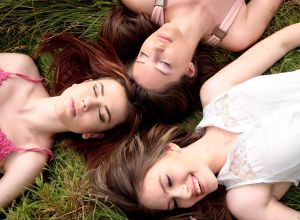Eczema (young people)
Eczema, also called dermatitis, is the name for a common group of skin conditions which cause dry itchy skin
The most commonly affected areas are the creases at the elbows and knees, as well as wrists and neck. It can cause coin-sized areas of inflammation and small bumps that coincide with your hair follicles. The skin can appear dry, red or can have little water blisters if on the edges of the fingers or toes.
Bacterial infection makes affected skin yellow, crusty and inflamed. Cold sores can cause sudden flare-ups.
Dealing with eczema
Eczema often improves and then gets worse again, it can be a longer term condition which is known as chronic, that means it can come and go. Many things can make it worse - heat, dust, woollen clothes, pets, food allergens, stress (like exams), as well as soaps, detergents and chemicals.
What can I do?
-
Treat it early – the worse it gets, the harder it is to control.
-
Moisturise, ideally at least 2-3 times a day. Use the most greasy, non-perfumed moisturiser your skin can tolerate.
-
Wash with a moisturiser - avoid bubble bath, shower gel and detergents.
-
Keep cool, and bathe in lukewarm water. Avoid washing more than once daily.
-
Moisturise before swimming, rinse well afterwards and apply plenty of moisturiser after drying.
-
Avoid wool next to your skin.
-
Try not to scratch. Smooth a moisturiser on instead.
-
Use non-biological washing powder and a double rinse cycle. Do washing at 60°C to kill dust mites.
-
Avoid perfumed products, like deodorants, shampoos and cleaning products.
-
If you shave, use an emollient instead of shaving cream.
-
Avoid close contact with anyone who has a cold sore.
-
Use dust mite covers on the beds
-
Avoid thick clothing on a nightime, wear loose cotton
Find out more at www.eczema.org.
How can atopic eczema be treated?
‘Topical’ means ‘applied to the skin surface’. Most eczema treatments are topical, although for more severe eczema some people need to take ‘oral’ medication (by mouth) as well.
‘Complete emollient therapy’ is the mainstay of treatment for all patients with eczema -this means regular use of a moisturiser (also known as an emollient) and washing with a moisturiser instead of soap (known as a soap substitute).




Antibiotics and antiseptics:
If your skin becomes wet, weepy and crusted, it may be infected and a course of antibiotics may be needed. Antiseptics, when applied to the skin alone or as part of a moisturising preparation, can be helpful in stopping the infection. Incorrect use of antiseptics can, however, irritate the skin and make eczema worse. Antiseptics should not be used continuously because this can result in excessive drying of the skin.
TOPICAL CALCINEURIN INHIBITORS
Calcineurin inhibitors, tacrolimus ointment and pimecrolimus cream, may be used when Eczema is not responding to topical steroids, or in skin sites which are more susceptible to the side effects of steroids, such as the face, eyelids and armpits and groin. The most common side effect is stinging on application but this normally disappears after a few applications. They are associated with an increased risk of skin infections and should not be applied to infected (weeping, crusted) skin.
Antihistamines:
Antihistamine tablets can be helpful in some patients particularly if there is an allergy trigger. Antihistamines that make people sleepy can be useful when used at night. They have no effect on the inflammation of eczema and are helpful largely as a result of their sedating effects, reducing sleep disruption.
Bandaging (dressings):
Cotton bandages and cotton or silk vests/leggings worn on top of creams can help keep creams from rubbing off and stop scratching. For some patients the use of medicated paste bandages may be helpful, as they are soothing and provide a physical barrier to scratching. It is important to be taught how to use the dressings correctly. Your doctor or nurse will advise you regarding the suitability of the various bandages and dressings available.
Avoidance of Allergens:
Atopic people often have allergies: Air borne allergens from cats, dogs, pollen, grass or the house dust-mite, can cause flares of Eczema in some patients.
Most eczema is not due to a specific allergy. It is important to seek medical advice before excluding any foods from your diet so you can ensure you are not missing any nutrients from your diet.
Latex (rubber) allergy is more common in people who are atopic. The symptoms may, consist only of itching of the skin after contact with rubber products.
Other treatments:
Ultraviolet light: Some people with chronic eczema benefit from ultraviolet light treatment, which is usually given in a specialist hospital department. People with severe or widespread atopic eczema not responding to topical treatments may need oral treatments (taken by mouth). These work by dampening down the immune system and are given under the close supervision of a dermatologist.
Eczema can significantly impact on your confidence, sleep, how you feel and cope with daily life, your ability to form friendships and how you apply your treatments. Some people also need wellbeing and psychology support to help them.
Visit pcds.org.uk for further trusted information.


